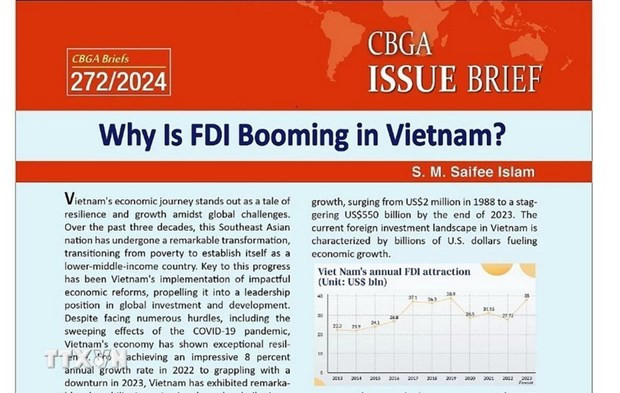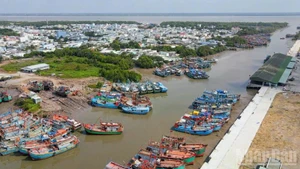The period from 2002 to 2023 witnessed Vietnam's remarkable economic expansion, underscoring the significant impact of strategic investments and forward-thinking policies, it said.
It added that over 35 years, Vietnam's registered FDI has experienced remarkable growth, surging from 2 million USD in 1988 to a staggering 550 billion USD by the end of 2023. The current foreign investment landscape in Vietnam is characterised by billions of US dollars fueling economic growth.
The country's strategic focus on high-tech sectors, including agriculture, manufacturing, services, and travel, further enhances its appeal for international investors. Also, Vietnam boasts over 36,000 active FDI projects with a total fund of 441 billion USD. Notably, 57% of these funds have been disbursed, reflecting the robustness of the foreign investment landscape in the country.
Over the past three decades, the Republic of Korea, Singapore and Japan have emerged as the top contributors to Vietnam's FDI landscape. With the upgrade of Vietnam-US relations to a Comprehensive strategic partnership in September 2023, expectations rise for a forthcoming fourth wave of FDI.
According to the article, Vietnam's strategic geographic location as a manufacturing hub and its pivotal role in the "China 1" strategy highlight its significance in East Asia's economic landscape. Vietnam provides a conducive environment for investment, thanks to its stable government, well-defined economic vision, fair policy control, minimal investment barriers, and attractive incentive schemes.
The nation's dedication to enhancing its business environment is apparent in its increasing rankings for ease of doing business, bolstered by a regulatory framework that emphasises efficiency and transparency. With a population of over 95 million, a growing middle class, and a services sector that contributes over 40% to its GDP, Vietnam offers a promising market for businesses. This is further supported by the rising consumer spending in the country. This combination of factors underscores Vietnam's impressive economic growth and its potential for reliable investment returns on both regional and global levels.
Moreover, Vietnam's active involvement in major global trade agreements, including the Regional Comprehensive Economic Partnership (RCEP), Comprehensive and Progressive Agreement for Trans-Pacific Partnership (CPTPP), and the EU-Vietnam Free Trade Agreement (EVFTA), has solidified its status as a sought-after destination for international trade. Vietnam's extensive network of Double Tax Avoidance Agreements with over 80 countries and territories is a crucial factor that attracts foreign investors. These agreements create a tax-friendly environment and encourage investments across borders, relieving the burden of double taxation.
Vietnam's focus on infrastructure development, as highlighted in its transport infrastructure master plan, also demonstrates a proactive approach to bolster economic growth. It has a labour market that is both large and highly competitive, with around 60 million individuals. The Vietnamese Government's consistent efforts to draw foreign investors through a range of incentives, particularly tax incentives, are crucial.
In conclusion, the article said with a stable government and a clear economic vision, Vietnam provides investors with a favourable environment characterised by fair policy control, minimal investment barriers, and robust incentive schemes.
















